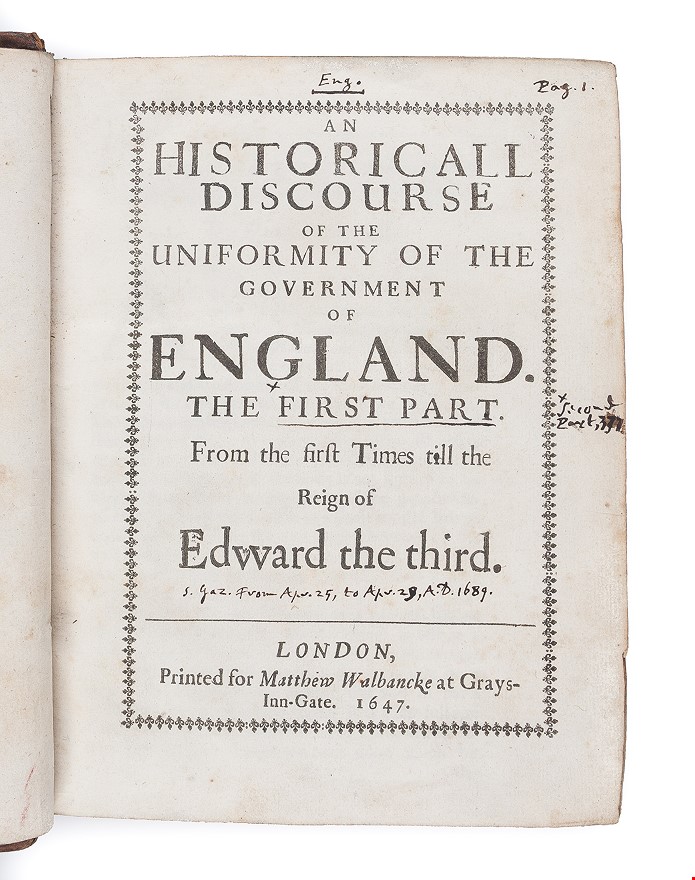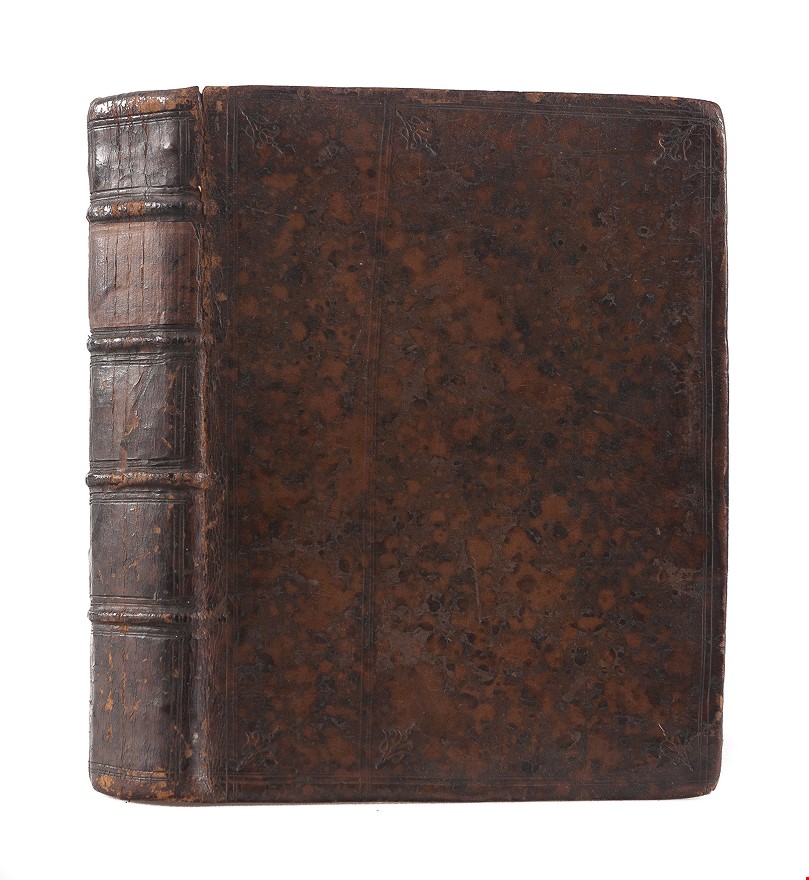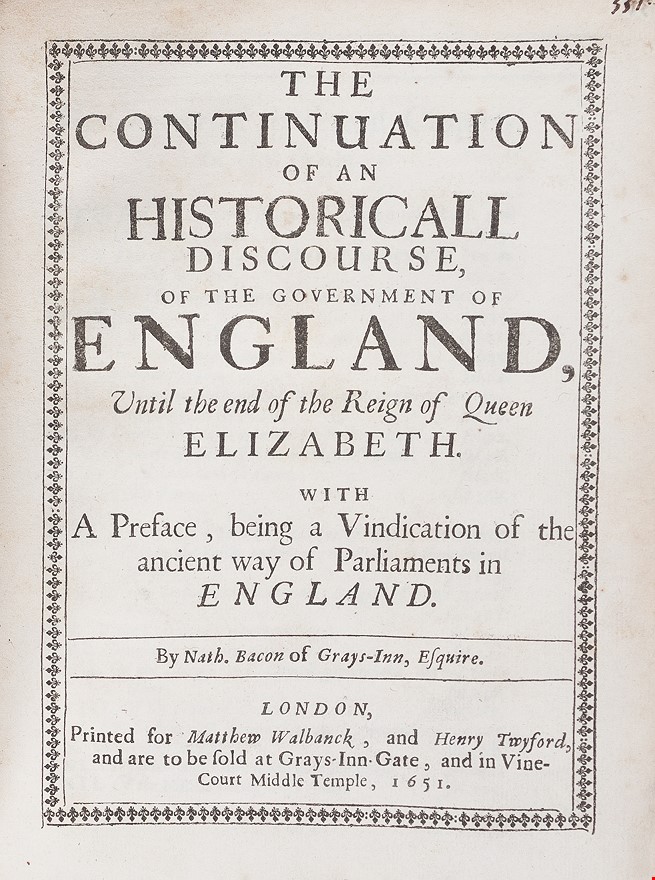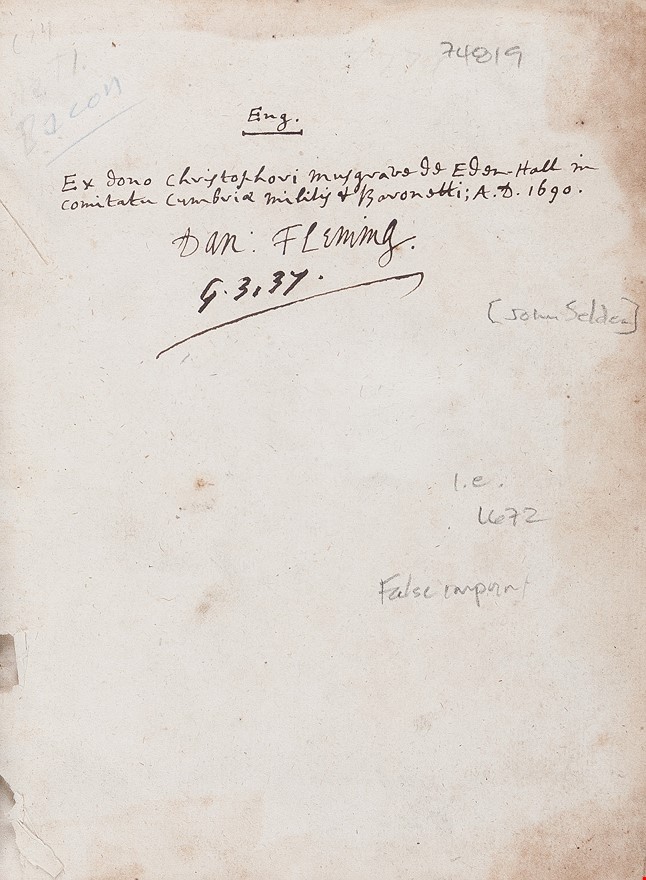An Historicall Discourse of the Uniformity of the Government of England. The First Part. From the first Times till the Reign of Edward the third. [- The Continuation of an Historicall Discourse of the Government of England, until the end of the Reign of Queen Elizabeth. With a Preface, being a Vindication of the ancient way of Parliaments in England. By Nath. Bacon of Grays-Inn, Esquire.] London: for Matthew Walbancke at Garys-Inn-Gate, 1647 [i.e. 1672]
BACON Nathaniel using notes left by John Selden.
£1500.00
Please contact us in advance if you would like to view this book at our Curzon Street shop.
Second (so-called "Secret") Edition. Small 4to (190 x 145mm). 2 Parts. [12], 323, [14]; [24], 307, [9] pp. A little minor spotting in places. Contemporary mottled calf, covers ruled in blind, manuscript paper label to the spine, marbled edges (joints and edges rubbed, some wear to the spine, endleaves browned by the turn-ins, paper spine-label darkened).
"London: for Matthew Walbancke at Grays- | Inn-Gate. 1647." [i.e. London: for John Starkey c. 1672 or 1677]
"This [scarcity of the first edition] occasion'd the private Reprinting of it in the year 1672, which as soon as the Government perceived, they Prosecuted both the Publisher and the Book so violently, that many hundreds of the Books were seized and burnt; ..." - John Starkey, bookseller, preface to the 1689 folio edition.
Wing B349. Entered by ESTC under John Selden. This attribution is based on a statement by the publisher John Starkey in the preface to the 1689 edition: "It was well known to, and owned by, the late Lord Chief Justice Vaughan, who was one of the Executors of the Great and learned Mr. Selden, that the Ground-work was his, upon which Mr. Bacon raised this Superstructure, which hath been and is so well esteem'd, that it is now again made publick, by John Starkey."
Although he is only named on the title to the Continuation (Part 2) and then in a way that could suggest he only wrote the preface, it is certain that the book was written not by Selden but by Nathaniel Bacon (1593-1660), presbyterian MP for Cambridge University in the Long Parliament from 1645 (briefly excluded in Pride's 'Purge' in December 1648).
Joseph A. Dane has unravelled the complictaed story of this edition in his essay, "Seized, Burnt, and Variant: Bibliographical Note on Nathaniel Bacon, 'An Historicall Discourse of the Uniformity of the Government of England' [1672]", in PBSA, Vol. 102/1 (March 2008), p. 95-102. This is the original issue of the ?1672 reprint of the 1647-51 first edition with the first printings of sheets A-D of Part 1 and sheets C-D of Part 2. Dane concludes that only those sheets were seized by the authorities and burnt, not the "many hundreds" of copies of the complete book that was suggested by Jghn Starkey in 1689. These sheets all had to be reprinted. Documents relating to the printing. Document sin the State Papers relating to the printing all date to 1677. The title is ESTC's setting (A), sheets B-C are in setting (2) and sheet D in setting (b) and the book equates to Dane's issue 1 (of 2) before the first three sheets of part 1 part 2
Bacon's Historicall Discourse is one of the key texts of 17th Century radical republicanism, a danger to the state after the Restoration, and a foundation-stone of the so-called 'Whig Interpretation of History' which sought to find historical precedents for an anti-monarchical system in vestiges of an ancient pre-Norman Anglo-Saxon constitution. Janelle Greenberg, in an excellent analysis of the book in her entry for Bacon in the Oxford Dictionary of National Biography, wrote:
"But Bacon's greatest service to anti-Stuart causes came in the form of a political tract entitled An Historical Discourse of the Uniformity of the Government of England, which was probably written using notes collected by John Selden. ... Continually republished well into the eighteenth century, when it won the praise of the elder William Pitt, An Historical Discourse was secretly reprinted in 1672, in 1682 at the time of the exclusion crisis, in 1689 at the revolution, again in 1739, and by 1750 in a fifth edition. So fearful were the royalists of Bacon's message that Charles II's government attempted to suppress it by prosecuting the radical printer John Starkey, perhaps a member of the Green Ribbon Club, who dared to publish it. .... Charles II and his advisers were right to be scared, for Bacon's An Historical Discourse argued with unrelenting force an anti-royalist ideology of enormous persuasive power. This was the radical ancient constitution which, according to modern scholarship, was first fully articulated during the civil wars by polemicists such as William Prynne and Bacon himself. Early a mainstay of the Long Parliament's cause, the ideology consisted of the following propositions: first, while government in general was from God, the particular form came from the people. In England the people in the remote past had made a contract with their ruler, a contract in which their obedience to him rested upon his governing according to the laws made by both king and community. The ruler who failed to act upon the bargain unkinged himself and left his subjects free to replace him with another."
Provenance: This copy links two prominent political figures and landowners in Westmorland - both on the Tory rather than Whig part of the spectrum. It was given in 1690 by Sir Christopher Musgrave to Sir Daniel Fleming, of Rydal Hall, Ambleside, and it has Fleming's signature and inscription "Ex dono Christophori Musgrave de Eden-Hall in Comitatu Cumbria militis & Baronetti; A.D. 1690." on the flyleaf; ti has his characteristic library markings: catalogue heading "Eng." ["England"] underlined on the front pastedown, flyleaf and title, the unpaginated leaves at beginning and end of both parts numbered in ink, the words "First Part" on the title underlined and with a marginal comment "*Second part, 337", ink note "Exa." ["Examinatur"] at the end.
Sir Christopher Musgrave, 4th Bt (1631/2-1704) was MP for Carlisle (in six parliaments from 1660-90), for Westmorland 1690-95, 98-1700, 1702-04, Appleby 1695-8, Oxford University 1698-1700, Totnes 1701-02. He was knighted in 1671 and succeeded his brother in the baronetcy c. 1687.
Sir Daniel Fleming, Kt (1633-1701), though active in local administration as a JP, commissioner for militia and sheriff, family commitments kept him largely away from London and he was MP for Cockermouth only from 1685-87 ("The Loyal Parliament"). He was, "a partisan moderate with considerable local prestige and a significant electoral interest" - The History of Parliament: the House of Commons 1690-1715. He was knighted in 1681. "An active tory alienated by James II, he became a moderate pursuer of Roman Catholics and Jacobites in the 1690s" (ODNB).
The fine condition of the Fleming books has made them much sought after by collectors, including the late Sir Geoffrey Keynes: 'Geoffrey was particularly delighted when another batch of Fleming's books came up at Christie's only ten years ago, a mine he thought exhausted 40 years earlier; he was particularly fond of Fleming, who seemed to share his tastes à travers les siècles'. (From Nicolas Barker's obituary of Sir Geoffrey Keynes (1887-1982), in The Book Collector, Winter 1982. The Fleming books en masse would have been an impressive sight, hundreds of volumes, all in plain calf or sheepskin with added paper labels written in the same hand in the early 18th. century when the books were turned-round so that the spines were showing instead of the fore-edges as in the traditional 17th. century arrangement, and all with Sir Daniel's neat annotations and markings. Later Provenance: by descent from Sir Daniel Fleming to Richard Le Fleming, of Rydal Hall, sale, Christie, 27/2/1969, lot 88 to Walford. Later bookseller's pencil marks on the front fyleaf; recently in the US trade.
Stock Code: 221009







